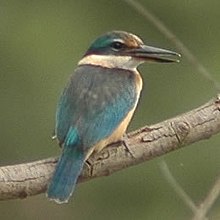Todirhamphus
| Todiramphus | |
|---|---|
 |
|
| Sacred kingfisher (Todiramphus sanctus) | |
| Scientific classification | |
| Kingdom: | Animalia |
| Phylum: | Chordata |
| Class: | Aves |
| Order: | Coraciiformes |
| Family: | Alcedinidae |
| Subfamily: | Halcyoninae |
| Genus: |
Todiramphus Lesson, 1827 |
| Species | |
|
see list |
|
see list
Todiramphus is a genus of kingfishers in the subfamily Halcyoninae. The name is often spelt Todirhamphus (with rh), but Todiramphus is the original valid spelling. The name literally means ‘tody-bill’; tody is a relative of the kingfishers with a similar slender long bill, and the Greek rhamphos (ῥάµϕος) means ‘beak, bill’.
There are around 20–22 extant species in the genus, but the classification of several Pacific island forms is still unclear. The range of the genus extends from the Red Sea in the west to French Polynesia in the east, with the greatest diversity in Australasia.
Members of Todiramphus are medium-sized kingfishers with flattened beaks. They are typically blue or blue-green above with pale underparts. They often have a pale collar and stripe over the eye. Many species are commonly found well away from water and feed largely on terrestrial animals such as insects and lizards. The nest is built in a cavity, most often in a tree.
...
Wikipedia
